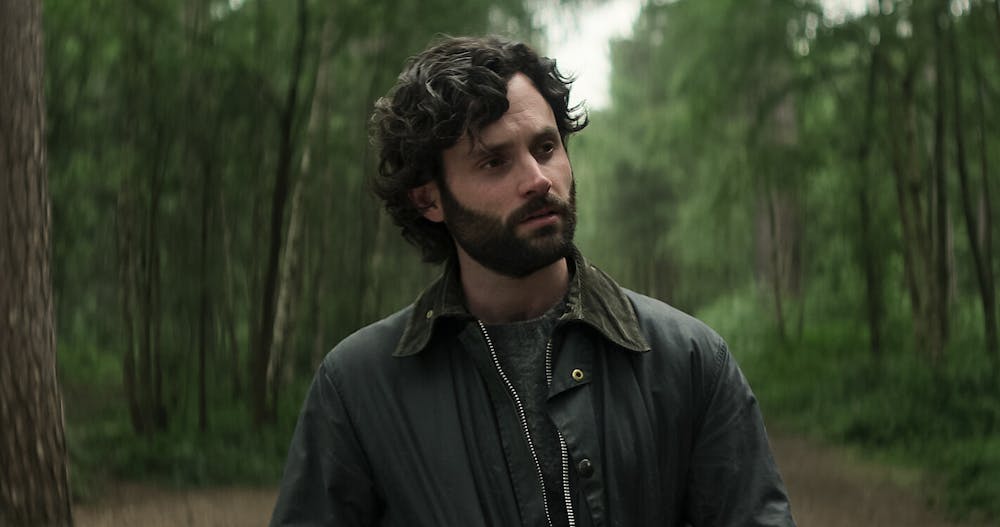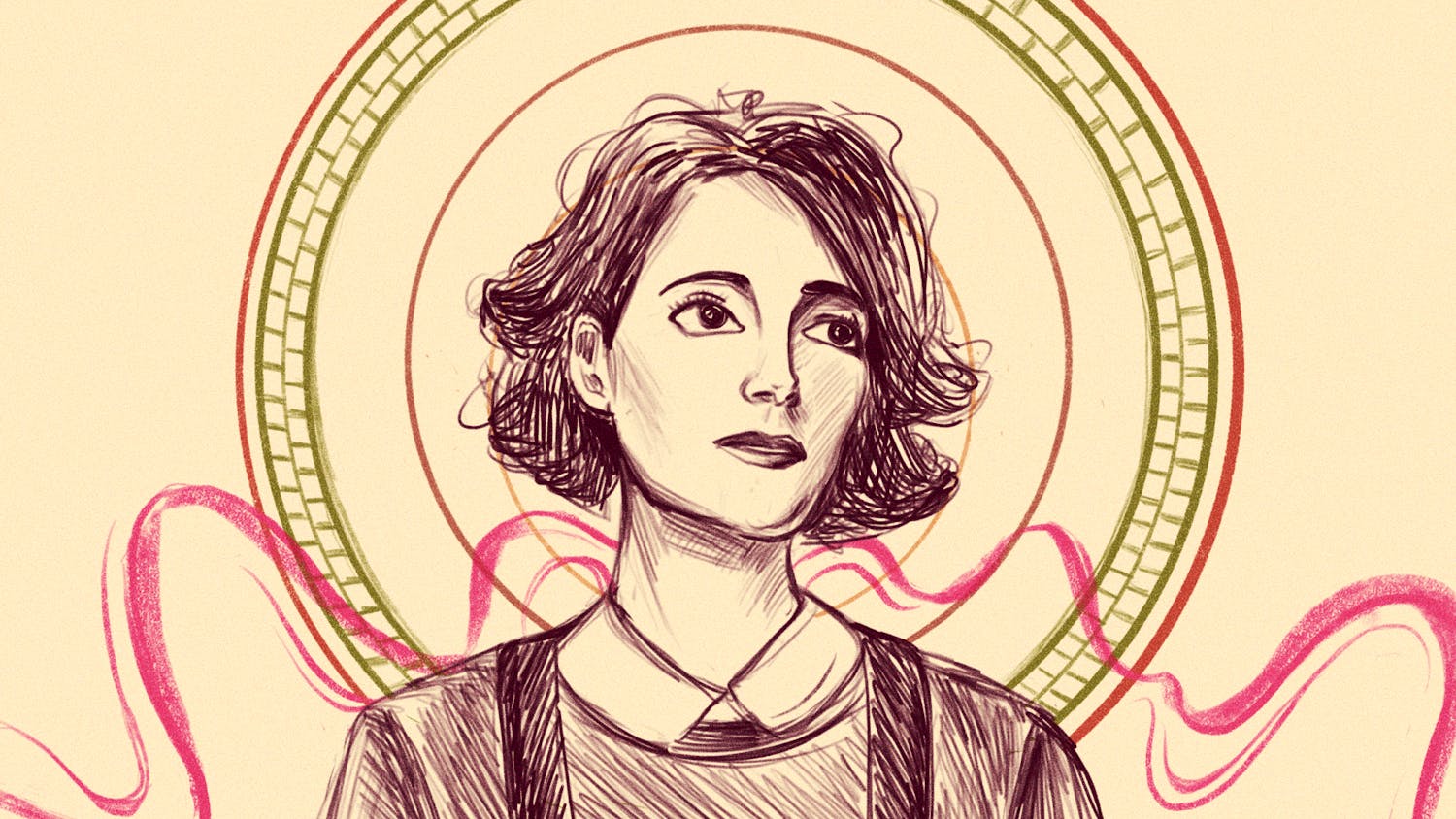There are shows that define a generation. Though perhaps not every member of Gen Z has watched “You,” many are familiar with the blue baseball cap that renders notorious stalker Joe Goldberg (Penn Badgley) largely invisible.
What previously made “You” great was its brilliant social commentary. It showed what cisgender, heterosexual, white male privilege lets someone get away with — Joe Goldberg is never a suspect because of his presumed innocence.
In season four, the show completely departs from what made it such a striking social commentary by casting Joe in the role of a victim. The season begins with Joe on the run after he murdered his wife, Love Quinn (Victoria Pedretti). He tries to find Marienne Bellamy (Tati Gabrielle), his season three obsession, but decides to let her go and stop pursuing her after she calls him a murderer.
Already, the season is not believable. Joe — who put a man through a meat grinder, kidnapped several women and murdered his wife — has a sudden change of heart, deciding that stalking women is beneath him. While characters are allowed to develop, this unexpected turn in Joe’s personality arrives with no build-up whatsoever. It’s like if Blair Waldorf decided to join the military or if Michael Scott won the Nobel Prize for physics.
While in London, where most of the season takes place, Joe encounters another lucky coincidence that requires the viewer to suspend their disbelief entirely: A hitman for the Quinn family, Elliot (Adam James), decides that he’s done with killing people just after being ordered to murder the protagonist. Instead, Elliot gives Joe a fake identity to set up a new life in London. Once again, Joe is just too lucky. But “You” isn’t about a lucky guy. It’s a show about a white guy with tremendous amounts of privilege and expert manipulation skills — or it used to be.
Joe uses his new identity to become a professor at an Oxford-esque university in London — with a new apartment conveniently located directly across from Kate Galvin (Charlotte Richie). Kate is the girlfriend of one of his fellow professors, Malcolm Harding (Stephen Hagan), and one night, relapsing into his old ways, Joe follows her to the parking lot but ends up preventing her from being mugged
This incident becomes Joe’s golden ticket into a circle of young British elites — an unnecessarily large collection of shoddy caricatures with poorly-constructed backstories — when Malcolm invites him to a party at an exclusive club as repayment for saving Kate.
In past seasons of the show, the characters were believable. Guinevere Beck (Elizabeth Lail), a struggling Master of Fine Arts student, and Forty Quinn (James Scully), the disappointment of his Los Angeles grocery store royalty family, both felt like people that might actually exist in real life. But in this season, the characters feel like they belong in a TV show — and I mean that in a bad way. From names like “Lady Phoebe Borehall-Blaxworth,” to a scene where one of the socialites makes workers pose as human lawn ornaments, none of the characters feel believable. And “You” demands believability — what used to make Joe’s actions so sinister is that they were rooted in the everyday realities faced by women.
The morning after meeting the elites, Joe wakes up with Malcolm’s dead body on his kitchen table and no recollection of what had happened. An expert in how to deal with a dead body, Joe disposes of it in a wood processing facility in the idyllic British countryside. When disposing of the professor’s body, the viewers are given an unnecessarily gratuitous, multiple-second shot that lingers on the dead man’s genitals. It’s obvious that the writers are just going for cheap shock value at this point, a disappointment for fans of a show that was once a masterclass in subtlety and elegantly executed twists.
Slowly but surely, Joe becomes a part of this circle of British elites. The writers try to make him into a working-class hero — the only one who sees through the British socialites’ absurd wealth and disgusting excess. The show tries to satirize British society and class, but because of its forced dialogue and implausible premise, it comes off as a half-baked imitation of “Knives Out,” trying to call attention to wealth disparities but failing miserably. The reveal that the person killing off the wealthy socialites is a resentful character who grew up in poverty is so on-the-nose that the viewer feels as though the showrunners expected them to be utterly unable to process subtle class commentary.
Additionally, Joe himself gains a stalker this season. After Malcolm’s death, Joe receives a text informing him that he didn’t actually murder his colleague and that someone is framing him — a reality that becomes clear as more of the elites die. It should feel like Joe is getting a taste of his own medicine, but instead, it just seems as if he was randomly placed in a particularly bad episode of “Pretty Little Liars.”
Each past season of the show had its strength: season one introduced us to Joe’s iconic inner monologue and blue baseball hat, season two had a plot twist nobody could ever see coming and season three had its own unique charm by satirizing suburbia. Season four has nothing that makes it great. It is utterly unsatisfying.
It’s clear the writers want audiences to root for Joe this season by casting him as the normal guy amongst the circle of rich assholes. But they seem to have forgotten that Joe is supposed to be the bad guy. He’s a murderer who stalks women and gets away with it because of his privilege. The show forgets such complexities in season four — and the result is an utter lack of self-awareness that makes for a disappointing viewing experience.
Indigo Mudbhary is a University news senior staff writer covering student government. In her free time, she enjoys running around Providence and finding new routes.





